Elevate
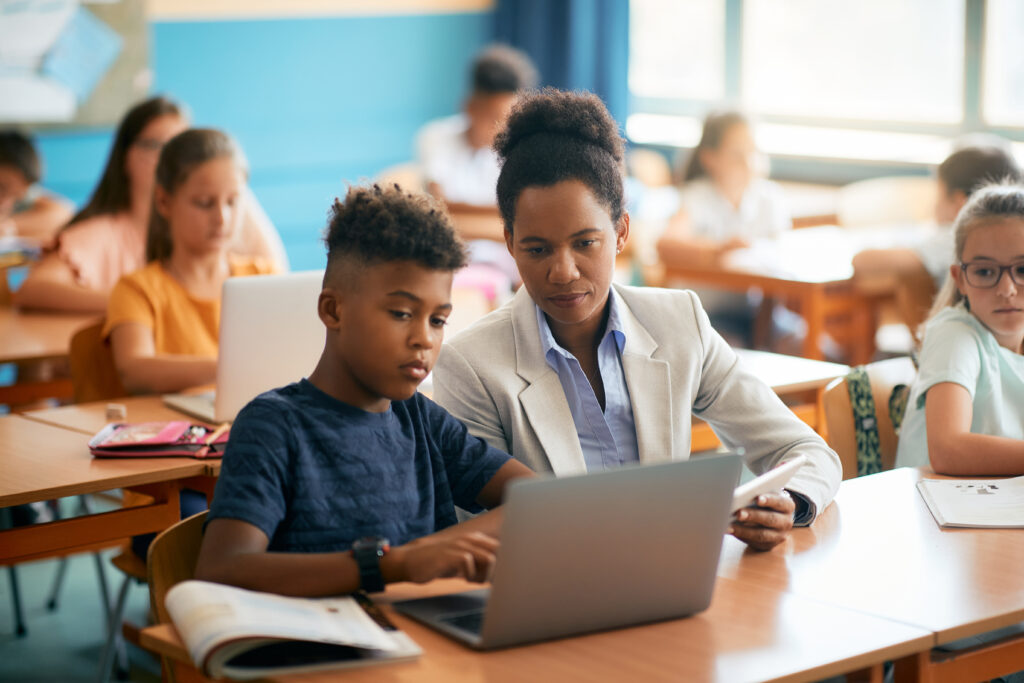
In partnership with Chicago Public Schools (CPS), the Education Lab evaluated a whole-school personalized learning reform model to bolster student achievement, particularly in high-need communities.
Challenge
Differences in academic achievement across student groups are persistent (and worsened in the pandemic), but research has shown that individualized instruction can be effective in rapidly improving academic achievement, offering one potential solution for closing educational gaps. However, these programs have historically been relatively small in scale.
Opportunity
To accelerate learning using an evidence-based approach, Chicago Public Schools launched an ambitious $25 million effort to embed personalized learning into elementary schools in low-income neighborhoods in Chicago. The Elevate model, implemented over 2.5 years, embeds a student-centered instructional model that infuses personalized learning practices into elementary schools on a scale not previously attempted by a large urban school district. The Education Lab conducted an implementation evaluation and randomized controlled trial to determine the impact of the Elevate initiative on student experience and achievement in three cohorts of schools across a 2.5-year period.
Project overview
Many education reforms focus on addressing differences in academic achievement between students with different backgrounds. Research in Chicago and elsewhere has shown that individualized instruction can be particularly effective in improving academic achievement. In light of this, in 2015, Chicago Public Schools (CPS) launched Elevate, an ambitious $25 million effort to embed personalized learning into elementary schools in low-income Chicago neighborhoods. Schools participating in Elevate received resources to develop the personalized learning environment, including intensive professional development support for administrators and teachers, technology devices to achieve 1:1 device-student ratios, education technology programs, and both a CPS Instructional Coach and a CPS social/emotional learning Coach to provide in-school support for individualized instruction and culture.
The University of Chicago Education Lab is currently evaluating the impact of the Elevate model on students’ learning and behavior with a randomized controlled trial of 45 elementary schools. This evaluation also includes a three-year implementation study by partners at the American Institutes for Research (AIR). Findings from AIR’s implementation study suggest consistency in the delivery of district-level supports to participating schools over the entire span of Elevate since these categories had the highest implementation fidelity for both cohorts and all participation phases. Moreover, the findings also highlight the need to re-examine the implementation of teacher training for any continued implementation or expansion of Elevate since this category has the lowest implementation fidelity for both cohorts and all participation phases.
The Education Lab is currently analyzing the impact of the Elevate model on student outcomes.
Years Active
2017 – present
Topics
Project Leads
Salman Khan
Research Director

Fatemeh Momeni
Research Director

Monica Bhatt
Senior Research Director

Jon Guryan
Faculty Co-Director

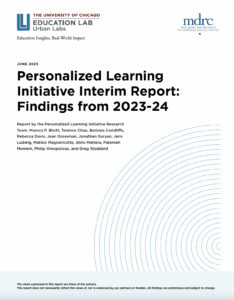
Personalized Learning Initiative Interim Report: Findings from 2023-24
The latest report by the PLI research team shows positive impacts from many types of tutoring–both more and less expensive tutoring models–across the country. These interim findings ought to encourage the field to stay the course in implementing high dosage tutoring, while improving dosage to yield greater learning gains for students.
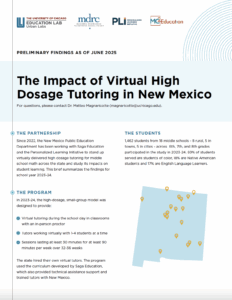
The Impact of Virtual High Dosage Tutoring in New Mexico
Since 2022, the New Mexico Public Education Department has been working with Saga Education and the Personalized Learning Initiative to stand up virtually delivered high dosage tutoring for middle school math across the state and study its impacts on student learning. This brief summarizes the findings for school year 2023-24.
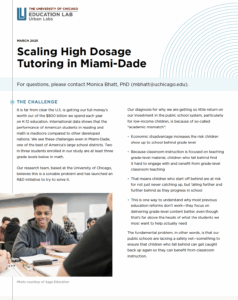
Scaling High Dosage Tutoring in Miami-Dade
In the 2023–2024 school year, the Education Lab launched a partnership with Miami-Dade County Public Schools to deliver in-school, intensive math tutoring. This brief highlights preliminary findings from the first year of implementation.
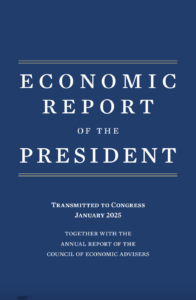
2025 Economic Report of the President
This report cites results from the Education Lab’s study of a high-dosage tutoring model–what we call “Saga Technology”–which found that substituting some tutor time with educational technology can reduce costs by one-third and halve the number of tutors needed without compromising effectiveness.
